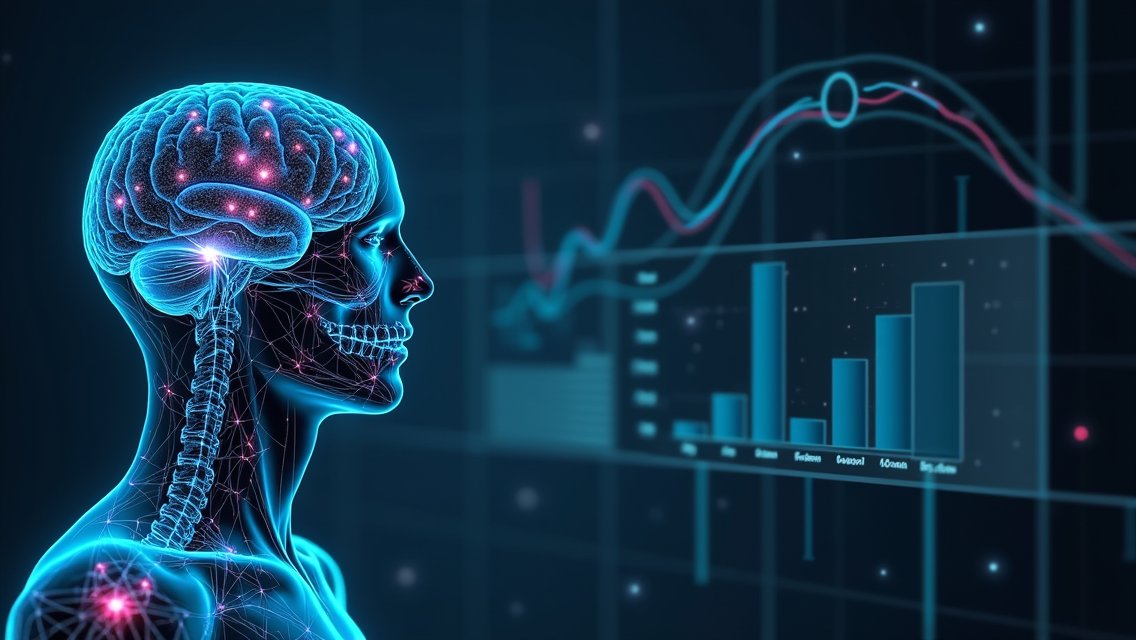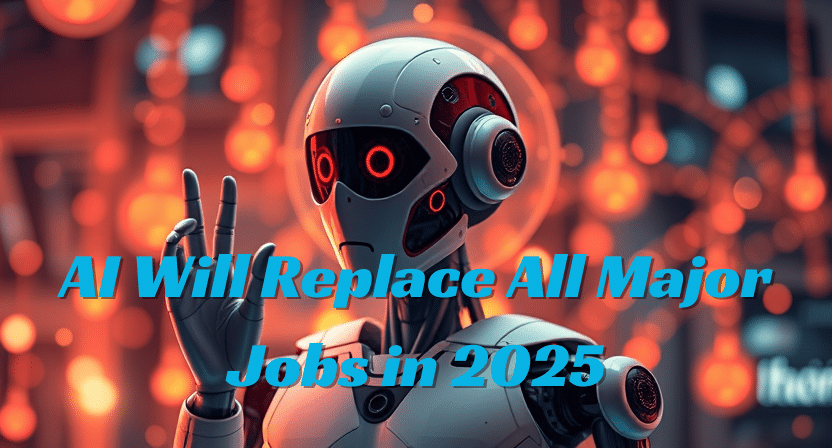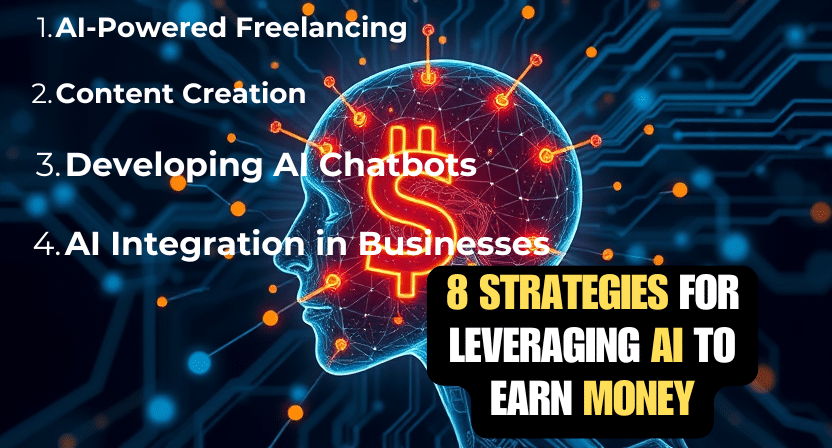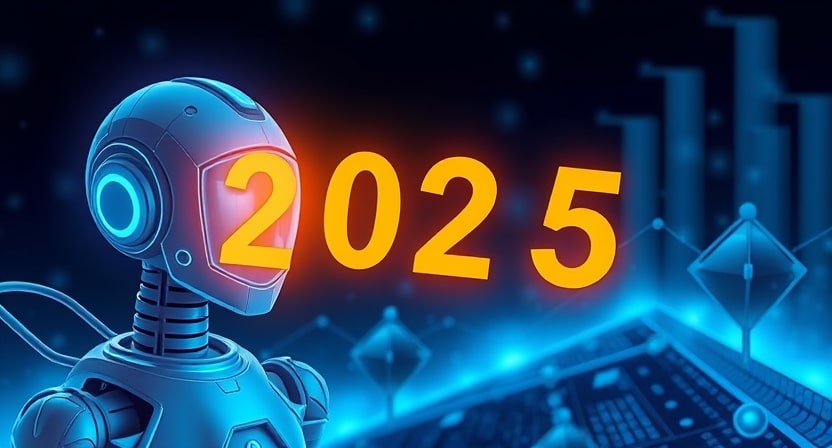Artificial Intelligence Death Calculator tool can estimate your lifespan. Do you believe that a tool can predict your death? We don’t encourage death but we support life with good health. However, today after the invention of Artificial Intelligence, it is possible that it can estimate your lifespan. In this article you will find more interesting and unbelievable information on Artificial Intelligence Death Calculator.
Don’t just think negative side of it, but there are special positive side of it. You can find it at the end of this article.
This article on Artificial Intelligence Death Calculator is only for information. So you need not to worry about it. Pay attention on how to live a long life with good health in mind and body.
Artificial Intelligence has already entered in film industry like it already entered in human lifespan. You can learn How Artificial Intelligence Affects Movies, Cinema And Film Industry in expanding its connection with movie creation.
Since we are talking about artificial intelligence let’s focus on how we can use artificial intelligence for developing our life. You can learn how to Earn Money With Artificial Intelligence, in the future.
As we know, nowadays in 10 methods ChatGPT helps people professionally and educationally to improve their daily life. Not only that, there are 11 methods that That ChatGPT Provides for earning money in future.
What is AI Death Calculator?
An artificial intelligence death calculator is an algorithm or tool designed to estimate a person’s life expectancy based on various health, lifestyle, and demographic factors.
These calculators typically use Artificial intelligence or machine learning models trained on large datasets of health records and statistical life expectancy data. The goal of such a calculator is to provide insights into longevity based on current health status and behaviors, though they can only provide estimates and not definitive predictions.
An Artificial intelligence death calculator is typically an online tool or software application, rather than a physical instrument or machine. It exists in digital form, often as a web-based platform, mobile app, or a feature within larger health or wellness apps.
Some sophisticated versions might integrate with wearable devices like smartwatches or fitness trackers, which collect biometric data (like heart rate, activity levels, or sleep patterns) in real-time.
How An Artificial intelligence death Calculator Usually Works
Artificial Intelligence Death Calculator is working in a systematic way that it first get data, process and give results. You can see them below in details for further knowledge.
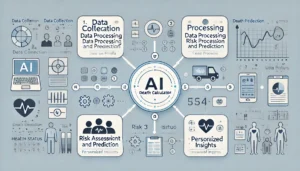
1. The first method of the artificial intelligence data calculator is to collect data of a person’s health. At data collection users input a range of personal information, such as age, gender, lifestyle habits (like smoking, diet, exercise), medical history, genetic predispositions, and sometimes even social factors like income and education level. Some calculators may also factor in biometric data, such as heart rate, blood pressure, and body mass index (BMI).
2. The second method of the artificial intelligence data calculator is to process the collected data. After getting your data, the AI uses this data to analyze patterns, often by comparing your profile to anonymized data from many others with similar profiles. It evaluates how these factors are statistically associated with longevity.
3. The third method of the artificial intelligence data calculator is to risk assessment and prediction. Once your data process is over the AI calculates an estimated lifespan based on risk factors and health trends. Some advanced models can give specific feedback, identifying which factors most significantly impact a user’s projected life expectancy.
4. The fourth method of the artificial intelligence data calculator is to personalize Insights. This is the special area to say that after analyzing your data it provides you in addition to estimating lifespan, many of these calculators aim to provide actionable advice for improving health and potentially increasing longevity. They may suggest adjustments in lifestyle habits, preventive measures for health risks, or even recommend certain medical screenings.
While artificial intelligence death calculators can give interesting insights, they should be viewed as educational tools rather than precise or definitive predictors of life expectancy. Many factors affecting health and lifespan are too complex or unpredictable for an AI to fully account for.
Positive Side of Artificial Intelligence Death Calculator
As we said in the introduction Artificial Intelligence Death Calculator has positive side as well. The specific goal of an AI death calculator is to use data-driven insights to help people understand and, ideally, improve their health and longevity.
Here you can find some of the positive side of it.
1. The first positive side of artificial intelligence death calculator is to raise awareness. By showing you how certain lifestyle choices or health conditions may impact life expectancy, these calculators raise awareness of risk factors that could shorten lifespan, such as smoking, obesity, or high stress levels. It will help you to rid of some unwanted and bad habits in life. That is a good news to improve our life style.
2. The second positive side of artificial intelligence death calculator is to encourage preventive health actions. Once you know your health condition by identifying specific areas that might benefit from improvement like exercise frequency, diet, or sleep quality, the tool can motivate you to adopt healthier habits, pursue preventive screenings, or seek early interventions for potential health issues. This is also good advice for your good health.
3. The third positive side of artificial intelligence death calculator is to provide personalized health insights. Not in general but in person you can get personal health advices by analysing your data. Through personalization, the calculator highlights individual factors contributing most to a user’s estimated lifespan. This might help users better understand the effects of their specific lifestyle and medical conditions on their health.
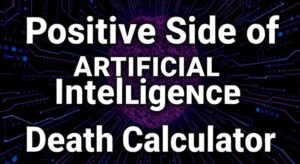
4. The fourth positive side of artificial intelligence death calculator is to support healthcare planning. You may use these insights to help your plan in healthcare needs or retirement, knowing you are statistically more or less likely to encounter certain health conditions as they age.
5. The fifth positive side of artificial intelligence death calculator is to promote self-reflection. These calculators can prompt you to reflect on your current lifestyle and consider long-term changes, potentially impacting not only longevity but also the quality of life.
Artificial Intelligence Death Calculator In Medical Field
As we know artificial intelligence death calculator is now available in medical field. Artificial intelligence-based life expectancy calculators, or similar predictive tools, are also indeed being explored in the medical field. We can see some application in hospitals and clinical settings. These tools are often part of larger predictive analytics platforms designed to support patient care and help medical professionals make informed decisions.
Many hospitals use predictive models to assess the risk of chronic illnesses, hospital readmissions, and mortality. End-of-Life Care Planning is also used along with artificial intelligence death calculator as predictive tools in palliative care and end-of-life planning to help doctors and patients make decisions about hospice care, advanced care planning, and other important choices.
The accuracy of these tools relies heavily on high-quality, comprehensive data. Hospitals must ensure patient data is secure and used ethically, in line with data protection regulations.
Predictive tools are not always fully accurate and may introduce biases if trained on unrepresentative data. This means that predictions are best used as supplemental insights, not as definitive conclusions.
Some patients and healthcare providers may be hesitant to rely on these tools for decisions about life expectancy, as it can be sensitive and sometimes distressing.
Artificial intelligence death calculators can help identify which patients may benefit most from aggressive treatments or alternative therapies based on predicted outcomes.
Now you can easily integrate Artificial Intelligence Search in WordPress Website.
Do you want to complete Master in Healthcare Administration? Find out Courses, Jobs and Salary .
Conclusion
The artificial intelligence death calculator is a fascinating example of how technology is shaping our understanding of health and longevity. By analyzing lifestyle, health data, and personal demographics, these tools can provide insights into life expectancy that help raise awareness and promote healthier choices. While not absolute in their predictions, they serve as valuable aids for preventive healthcare and personalized wellness guidance. However, they should be used cautiously, as life expectancy is influenced by numerous unpredictable factors. Ultimately, these calculators represent a blend of science, technology, and a growing focus on proactive health management.
